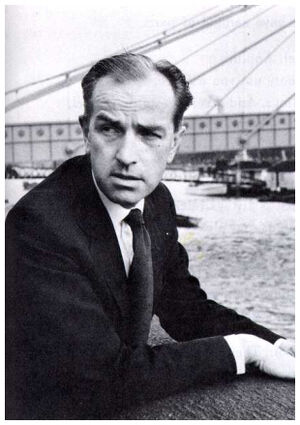
Henry Reed (22 February 1914 - 8 December 1986) was a British poet, translator, radio dramatist and journalist.
He was born in Birmingham and educated at King Edward VI School, Aston, followed by the University of Birmingham. At university he associated with W. H. Auden, Louis MacNeice and Walter Allen. He went on to study for an MA and then worked as a teacher and journalist. He was called up to the Army in 1941, spending most of the war as a Japanese translator.
After the war he worked for the BBC as a radio broadcaster and playwright, where his most memorable set of productions was the Hilda Tablet series in the 1950s. The series started with A Very Great Man Indeed, which purported to be a documentary about the research for a biography of a dead poet and novelist called Richard Shewin. This drew in part on Reed's own experience of researching a biography of the novelist Thomas Hardy. However, the 'twelve-tone composeress' Hilda Tablet, a friend of the late Richard Shewin, became the most interesting character in the play; and in the next play, she persuades the biographer to change the subject of the biography to her - telling him "not more than twelve volumes". Dame Hilda, as she later became, was based partly on Ethel Smyth and partly on Elisabeth Lutyens (who was not pleased, and considered legal action).
Reed's most famous poem is Lessons of the War, a witty parody of British army basic training during World War II, which suffered from a lack of equipment at that time. Originally published in New Statesman and Nation (August 1942), the series was later published in A Map of Verona in 1946, and was his only collection to be published within his lifetime. Another anthologised poem is Chard Whitlow, a clever satire of T. S. Eliot's Burnt Norton. Eliot himself was amused by Chard Whitlow's mournful imitations of himself ("As we get older we do not get any younger ...").
Unfortunately for Reed he was forever being confused with the much better known Sir Herbert Read; the two men were unrelated. Reed responded to this confusion by naming his alter ego biographer in the Hilda Tablet plays "Herbert Reeve" and then by having everyone else get the name slightly wrong.
Radio Plays
- The Hilda Tablet Plays:
- A Very Great Man Indeed 1953
- The Private Life of Hilda Tablet 1954
- Emily Butter (14 November 1954)
- A Hedge, Backwards (29 February 1956)
- The Primal Scene, As It Were (11 March 1958)
- Not a Drum Was Heard (6 May 1959)
- Musique Discrète (27 October 1959)
- Noises On 1947.
- Noises: Nasty and Nice, 1947.
- Moby Dick: A Play for Radio from Herman Melville's Novel 1947.
- Pytheas, 1947.
- Leopardi: The Unblest, The Monument, 1949.
- A By-Election of the Nineties, 1951.
- The Dynasts, 1951
- Malatesta, 1952.
- The Streets of Pompeii 1952
- The Great Desire I Had, 1952.
- Return to Naples, 1953.
- All for the Best, 1953.
- Hamlet; or, The Consequences of Filial Piety, 1954.
- The Battle of the Masks, 1954.
- The Queen and the Rebels, 1954.
- The Burnt Flower-Bed, 1955.
- Vincenzo, 1955.
- Crime on Goat Island, 1956.
- Don Juan in Love, 1956.
- Alarica, 1956.
- Irene, 1957.
- Corruption in the Palace of Justice, 1958.
- The Auction Sale, 1958.
- The Island Where the King Is a Child, 1959.
- One Flesh, 1959.
- The House on the Water, 1961.
- A Hospital Case, 1961.
- The America Prize, 1964.
- Zone 36, 1965.
- Summertime, 1969.
- The Two Mrs. Morlis, 1971.
References
http://en.wikipedia.org/wiki/Henry_Reed_%28poet%29
Peacock, Scot, ed. "Reed, Henry 1914-1986." Vol. 78, Contemporary Authors, New Revision Series. Detroit: Gale Group, 1999. 408-410.